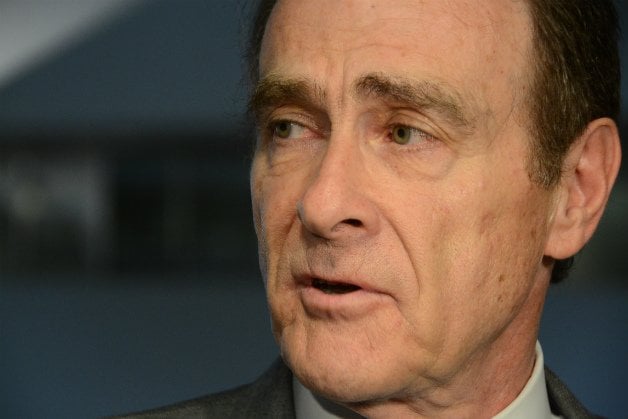
When thousands of people take to the streets on Sunday (June 29) as part of the biggest LGBTQ festival in Toronto’s history, an unlikely figure will be leading council’s contingent in the parade: Deputy Mayor Norm Kelly.
Thanks to Rob Ford’s descent into addiction, Kelly has been temporarily elevated to the city’s most powerful office. Many expected him to be a better mayor than Ford, but few anticipated that the 72-year-old would be such an enthusiastic supporter of the queer community.
Compared to other members of council, Kelly was never outspoken about LGBTQ issues. But during the Sochi Olympics in February, he took a stand for gay rights when Ford tried to have the Pride flag taken down from outside City Hall. As the mayor railed, Kelly calmly invited representatives from LGBTQ groups into his office, sending a powerful signal that Ford’s bigoted views are not shared by all at City Hall.
Since then Kelly has presided over the flag-raising ceremony for the International Day Against Homophobia and Transphobia, honoured out-going Toronto PFLAG president Irene Miller at council, and helped organize PFLAG “lunch-and-learn” events for city staff. Along with Councillor Kristyn Wong-Tam, he has been the face of the promotional campaign for a mass same-sex wedding during WorldPride.
Wong-Tam, council’s only openly gay member, has credited Kelly with helping the city turn the page after Ford’s homophobia made international headlines.
“I want to applaud the deputy mayor for his tremendous leadership,” Wong-Tam said at the Pride wedding launch last month. “He has done a fantastic job of demonstrating to our community and to the communities across Toronto that they belong here, that there is a place for them in the city.”
Since council handed him most of the mayor’s powers in November, Kelly and his staff have been working out of the glass-lined “fishbowl” on the second floor of City Hall. The walls of his corner office are filled with historical art from the city’s collection, including an imposing portrait of William Lyon Mackenzie that looms from behind the deputy mayor’s desk. The only sign of Kelly’s more liberal tastes are two drawings of bare-skinned women rendered in electric blues and pinks, created by students at Scarborough’s Wexford Collegiate School for the Arts.
When asked whether he thinks people might be surprised that a septuagenarian, married male councillor has decided to position himself as an LGBTQ ally, Kelly rejects the question. “I wouldn’t even know how to react to that,” he says.
He admits his views on LGBTQ people have changed since he was a young man, however. “I’m a product of my generation, the ethos of that age,” he says. Despite repeated prodding, he refuses to ascribe that change to anything personal. He insists there was no person or moment in his life that led to his recognition of gay rights.
A trained historian and former teacher, he instead frames his changing views in terms of sweeping historical forces.
“We’ve gone from basically a British, fairly homogeneous society of people from northwestern Europe to a society that now includes everyone from all over the world,” he explains. Greater equality for LGBTQ citizens “is just another stage in building the inclusiveness that characterizes this city.”
Mining his days as a geology student, he offers another metaphor for what he sees as society’s gradual progress toward LGBTQ equality.
“The sediment just drifts, and over time it deepens. And, voilà, you have rock after a while,” he says.
And how solid is that rock? Kelly points to the recent election of Kathleen Wynne, Canada’s first openly gay premier, as evidence that society’s foundation has permanently shifted in favour of queer rights.
“Did you notice that during this provincial election, no one raised the issue of the premier’s situation? There weren’t people at rallies with posters, no one heckling her and yelling at her,” he says. “So I think there’s been a considerable change in the attitude of the majority of Torontonians and Canadians.”
Anyone who recalls the bathhouse raids of 1981 or has seen the latest statistics on LGBTQ homeless youth will likely take issue with Kelly’s description of gay equality as something as natural and inevitable as the formation of the hills. But Kelly does seem motivated by a genuine belief that LGBTQ residents shouldn’t feel excluded by their mayor, even if his time in the role is temporary.
“It’s my understanding of the office of the mayor… that you’re everybody’s mayor and everyone should be included,” he says.
Whether or not he acknowledges it, Kelly’s age does make him stand out as an LGBTQ advocate.
According to Anne Creighton, president of Toronto PFLAG, these days more and more older people are accepting gay rights. Still, Kelly sets a positive example for people his age who might be struggling with a family member’s identity – or even their own.
“We have members in Toronto PFLAG who came out in their 60s and 70s,” Creighton says. Gay people, no matter their age, look for role models who are accepting. “For the generation that might relate to Norm Kelly, it’s terrific for them to see someone from their generation who’s a role model.”
Toronto PFLAG invited Kelly to march with them in the Pride Parade two weeks ago, and he accepted. It will be the first time he’s ever taken part.
“He’s really taken the mayor’s responsibility to represent everyone seriously,” says Creighton.
bens@nowtoronto.com | @benspurr












